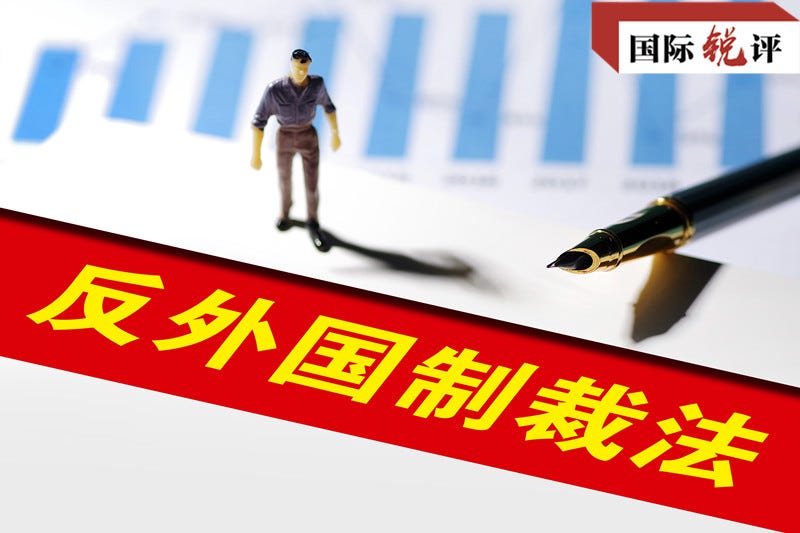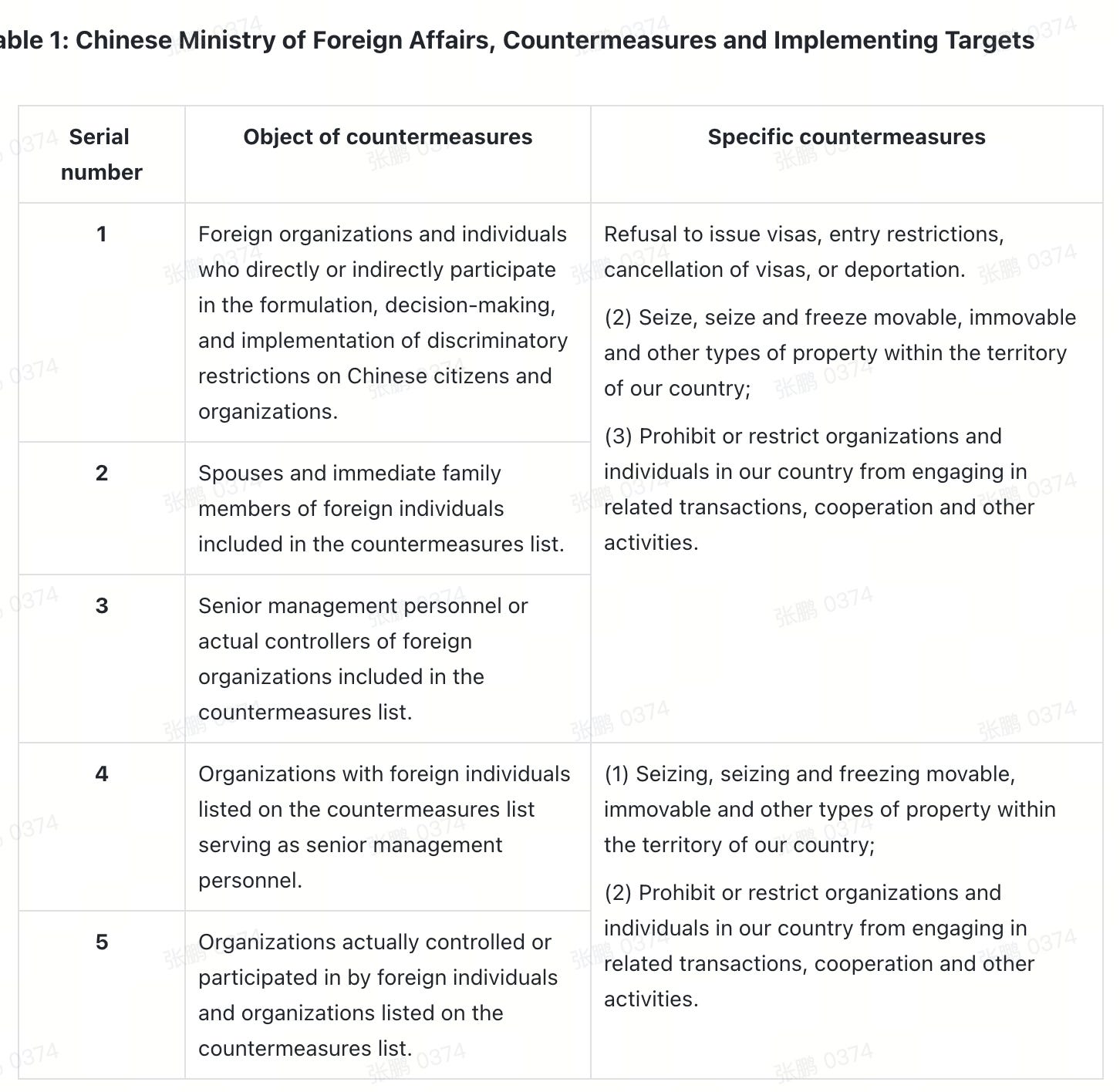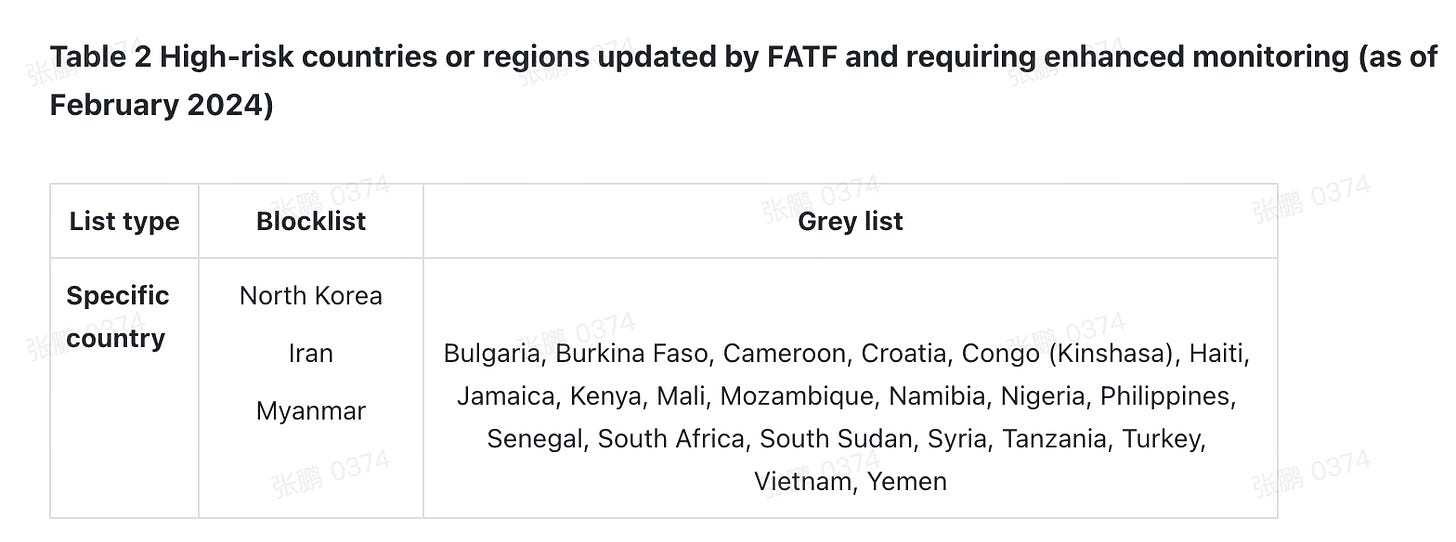Wang Linggang(汪灵罡), Arbitrator of the Shanghai International Economic and Trade Arbitration Commission, wrote a very detailed analysis of the operating mechanism of China’s Anti Foreign Sanction Law. I hereby translated it into English for anyone interested in the sanction regime.
Introduction
On May 22, 2024, the Ministry of Foreign Affairs issued the "Decision on Countermeasures Against U.S. Defense Companies and Senior Executives" (Ministry of Foreign Affairs Order No. 7), announcing countermeasures against 10 U.S. defence companies, including Lockheed Martin Missiles and Fire Control, and 12 of their senior executives. The countermeasures include "freezing the movable, immovable, and various other types of properties of these companies within China," and denying the relevant personnel visas and entry (including Hong Kong and Macau).
This is the second time the Ministry of Foreign Affairs has announced countermeasures in 2024. On January 7, 2024, in response to the U.S. arms sales to the Taiwan region and sanctions against Chinese entities, the Ministry of Foreign Affairs announced that "based on the Anti-Foreign Sanctions Law, China has decided to impose sanctions on BAE Systems Land and Armament, Alliant Techsystems Operation, AeroVironment, ViaSat, and Data Link Solutions." The measures include "freezing movable, immovable, and various other types of properties within China and prohibiting Chinese organizations and individuals from engaging in transactions or cooperation with them."
Since the first implementation of countermeasures in October 2020, China has repeatedly responded to serious interference in its internal affairs and severe defamation of its image by foreign countries, organizations, and individuals, such as the United States, the European Union, the United Kingdom, and Lithuania, in the form of "countermeasures." This latest response once again demonstrates the Chinese government's firm opposition and strong condemnation of such behaviours.
On the Ministry of Foreign Affairs' official website, these "countermeasures" are often referred to as "sanctions". In customary civil discourse and news reports, "countermeasures" and "sanctions" are synonymous and interchangeable terms.
Accordingly, compiling the targets subjected to these "countermeasures" or "sanctions" by China results in the Ministry of Foreign Affairs' "Countermeasure List." It is important to note that the Ministry of Foreign Affairs has not established or published a complete "sanction list." The current "sanction list" we can see is compiled by the legal and academic communities for research convenience.
I. Development Stages of the Ministry of Foreign Affairs' Countermeasures
The Ministry of Foreign Affairs countermeasures has undergone a developmental process from non-existence to specificity, from ambiguity to concreteness, and from minor to significant. Generally speaking, the implementation of the Anti-Foreign Sanctions Law on June 10, 2021, marks a clear demarcation, dividing the process into two distinct phases.
1. Situation Before the Implementation of the Anti-Foreign Sanctions Law
For a long period before the formal implementation of the Anti-Foreign Sanctions Law, the Chinese government did not counteract the various sanctions imposed by the United States and the European Union on Chinese enterprises and individuals with equivalent counter-sanctions, primarily using diplomatic means for condemnation and protest.
For instance, in response to the U.S. government’s sanctions against China based on the International Religious Freedom Act in 2000, sanctions against China Metallurgical Equipment Corporation in 2001, sanctions against four Chinese companies, including Great Wall Industrial Corporation in 2006, and sanctions against Zhuhai Zhenrong Company and Kunlun Bank in 2012, the Ministry of Foreign Affairs at the time expressed "strong dissatisfaction and firm opposition," "lodged solemn representations to the U.S. government," and "requested the U.S. to change its decisions and abandon the wrong practice of imposing sanctions and pressure," "and to stop doing things that harm China’s interests and China-U.S. relations."
2. First Implementation of Countermeasures in 2020
On July 12, 2019, Ministry of Foreign Affairs spokesperson Geng Shuang warned: "The U.S. arms sales to Taiwan severely violate international law and the basic norms governing international relations, seriously violate the one-China principle and the three Sino-U.S. joint communiqués, and harm China’s sovereignty and national security. To safeguard national interests, China will impose sanctions on U.S. companies involved in the arms sales to Taiwan."
On October 26, 2020, Ministry of Foreign Affairs spokesperson Zhao Lijian announced at a regular press conference: "China will impose sanctions on Lockheed Martin, Boeing Defense, Raytheon, and other U.S. companies involved in the Taiwan arms sales, as well as on individuals and entities that played an egregious role in the process."
This marked the first time the Chinese government imposed sanctions on foreign organizations and individuals to safeguard national interests.
3. Situation After the Implementation of the Anti-Foreign Sanctions Law
The Anti-Foreign Sanctions Law, though concise with only 16 articles and over 1200 words, is comprehensive, establishing the basic legal framework for China’s counter-sanctions against foreign sanctions.
Since the official implementation of the Anti-Foreign Sanctions Law on June 10, 2021, there has been a noticeable increase in the frequency and number of countermeasures announced by the Ministry of Foreign Affairs.
II. Specific Content of the Ministry of Foreign Affairs Countermeasures
1. Trigger Conditions for Countermeasures
As the name implies, "countermeasures" are retaliatory actions against "sanctions." The trigger conditions for the Ministry of Foreign Affairs' countermeasures are "foreign countries violating international law and basic norms of international relations, using various excuses or their domestic laws to contain and suppress China, and imposing discriminatory restrictive measures on Chinese citizens and organizations, interfering in China's internal affairs."
There is no unified standard for what constitutes "international law and basic norms of international relations." The Anti-Foreign Sanctions Law of China recognizes "international law and basic norms of international relations" as the "international system centred on the United Nations and the international order based on international law."
2. Targets and Implementation of Countermeasures
The targets of the Ministry of Foreign Affairs' countermeasures are specific "foreign organizations and individuals," rather than abstract foreign countries and regions. Unlike the U.S. Department of the Treasury's Office of Foreign Assets Control (OFAC) sanctions list, the Ministry of Foreign Affairs' countermeasures do not target inanimate objects such as aircraft or ships. In certain cases, the scope of the Ministry's countermeasures may extend to the spouses, direct relatives, senior management, and actual controllers of the sanctioned entities.
2.1 Targets of Countermeasures
(1) Foreign organizations and individuals that directly or indirectly participate in the formulation, decision, and implementation of discriminatory restrictive measures against Chinese citizens and organizations;
(2) Spouses and direct relatives of foreign individuals listed in the countermeasure list;
(3) Senior management or actual controllers of foreign organizations listed in the countermeasure list;
(4) Organizations where foreign individuals listed in the countermeasure list serve as senior management;
(5) Organizations that are actually controlled or participated in the establishment and operation by foreign individuals and organizations listed in the countermeasure list.
2.2 Specific Countermeasures
The Ministry of Foreign Affairs' countermeasures exert pressure on the sanctioned entities through visa restrictions, asset freezes, and restrictions on transactions and cooperation.
(1) Denying visa issuance, entry bans, visa cancellations, or deportation;
(2) Sealing, seizing, or freezing movable, immovable, and various other types of properties within China;
(3) Prohibiting or restricting Chinese organizations and individuals from conducting related transactions and cooperation with the sanctioned entities.
III. The Ministry of Foreign Affairs' "Countermeasure List" is Not a "Terrorist List"
The Ministry of Foreign Affairs' "Countermeasure List" does not target "terrorists" and its purpose is not to combat "terrorist financing." Therefore, the "Countermeasure List" is not applicable to the fight against terrorist financing.
Article 24 of the Anti-Terrorism Law confirms that the People's Bank of China is the supervisory authority for "counter-terrorism financing," but the People's Bank of China has never issued a "terrorist list" or any list of financial sanctions against specific entities, organizations, or individuals. Therefore, China does not have a list of financial sanctions in the context of counter-terrorism financing.
Currently, the regulatory rules recognized by the People's Bank of China specify that the "list of terrorist organizations and individuals" that obligated institutions must adhere to is very narrow, limited to four categories:
1. United Nations Security Council Sanctioned Terrorist Lists
This includes multiple terrorist organizations and individuals such as ISIS, Boko Haram, and al-Qaeda.
2. Ministry of Public Security Sanctioned East Turkistan Terrorist Lists
Based on the National People's Congress Standing Committee's "Decision on Issues Related to Strengthening Anti-Terrorism Work," the Ministry of Public Security issued three batches of lists targeting the East Turkistan Islamic Movement in 2003, 2008, and 2012, involving a total of four terrorist organizations and 25 individuals involved in terrorist activities.
3. Judicially Issued Terrorist Lists
The Supreme People's Court and the Supreme People's Procuratorate have not issued any terrorist lists.
4. Other Suspected Terrorist Organizations and Individuals Listed by the People's Bank of China
Under the "Risk Alerts and Financial Sanctions" section on its official website, the People's Bank of China lists the "terrorist sanctions list," which only includes the United Nations Security Council sanctions lists against ISIS, al-Qaeda, and the Taliban.
In this section, the People's Bank of China also lists the "Non-proliferation Sanctions List," the "Other Sanctions Lists" (such as sanctions on illegal oil exports from Libya), and the "High-risk and Other Monitored Jurisdictions" list updated by the Financial Action Task Force (FATF).
5. If laws or administrative regulations provide other provisions for monitoring the above lists, those provisions shall be followed.
IV. The Mandatory Effectiveness of the Ministry of Foreign Affairs' "Countermeasure List"
Although the Ministry of Foreign Affairs is not the industry regulator for Chinese financial institutions, and its countermeasure list is not specifically designed for financial sanctions, the countermeasures issued by the Ministry are based on the Anti-Foreign Sanctions Law. These measures do not differentiate between applicability to financial institutions and non-financial institutions, thus making the "Countermeasure List" mandatory for financial institutions within China.
For example, on March 22, 2021, the Ministry of Foreign Affairs imposed sanctions on several members of the European Parliament, announcing that "the relevant individuals and their families are prohibited from entering mainland China, and the Hong Kong and Macau Special Administrative Regions, and their associated enterprises and institutions are also restricted from engaging with China." If any of these sanctioned EU parliamentarians serve as independent directors of enterprises in China (including financial institutions), the relevant enterprises must terminate their independent directorships.
Similarly, on April 7, 2023, Ministry of Foreign Affairs Order No. 1 imposed countermeasures against the Hudson Institute, the Reagan Library, and their leaders. Consequently, any organization or individual within China must not engage in any transactions, exchanges, or cooperation with these sanctioned entities or individuals; any ongoing activities must be immediately and unconditionally terminated.
V. The Practical Challenges Posed by U.S. and EU Sanctions Lists to the Anti-Foreign Sanctions Law
The U.S. Department of the Treasury's Office of Foreign Assets Control (OFAC) and the Council of the European Union have established numerous sanctions lists, which vary in complexity, scope, and severity. These sanctions lists represent unilateral exercises of extraterritorial jurisdiction by the U.S. and the EU based on their respective domestic and regional laws. These sanctions lists are highly comprehensive, with counter-terrorism financing being just one aspect.
Taking the U.S. OFAC sanctions list as an example, its targets include:
1. Specific countries and regions
2. Terrorists
3. International drug traffickers
4. Proliferators of weapons of mass destruction
5. Other individuals and entities deemed a threat to U.S. national security, foreign policy, or economic interests
As of May 22, 2024, the U.S. OFAC had sanctioned 606 Chinese entities and individuals.
Article 12 of the Anti-Foreign Sanctions Law states: "No organization or individual shall execute or assist in executing discriminatory restrictive measures taken by foreign countries against Chinese citizens or organizations. Suppose an organization or individual violates the provisions of the preceding paragraph and infringes upon the legitimate rights and interests of Chinese citizens or organizations. In that case, the affected Chinese citizens or organizations may file a lawsuit in a people's court, requesting the cessation of the infringement and compensation for losses." This implies that if the U.S. Department of the Treasury or the Council of the European Union includes Chinese entities or individuals in their sanctions lists, Chinese financial institutions should not comply.
However, in practice, any Chinese financial institution or specific non-financial institution engaged in cross-border transactions cannot ignore the U.S. OFAC sanctions list without facing severe consequences. For example, under Section 311 of the U.S. Patriot Act, the U.S. Secretary of the Treasury has the authority to subpoena foreign banks that do not comply with the OFAC sanctions list and can order U.S. banks to cease providing USD correspondent account services to such foreign banks. This can result in the freezing and confiscating of funds held in these USD correspondent accounts.
In conclusion, Chinese financial institutions must pay close attention to the U.S. OFAC sanctions list, whether state-owned or foreign-invested. Their differences lie primarily in the degree to which they adhere to these lists.






